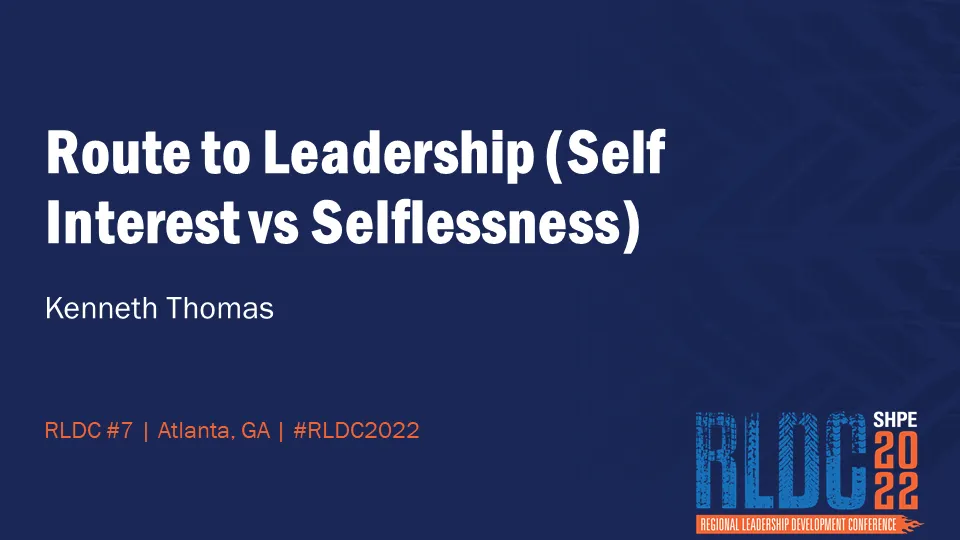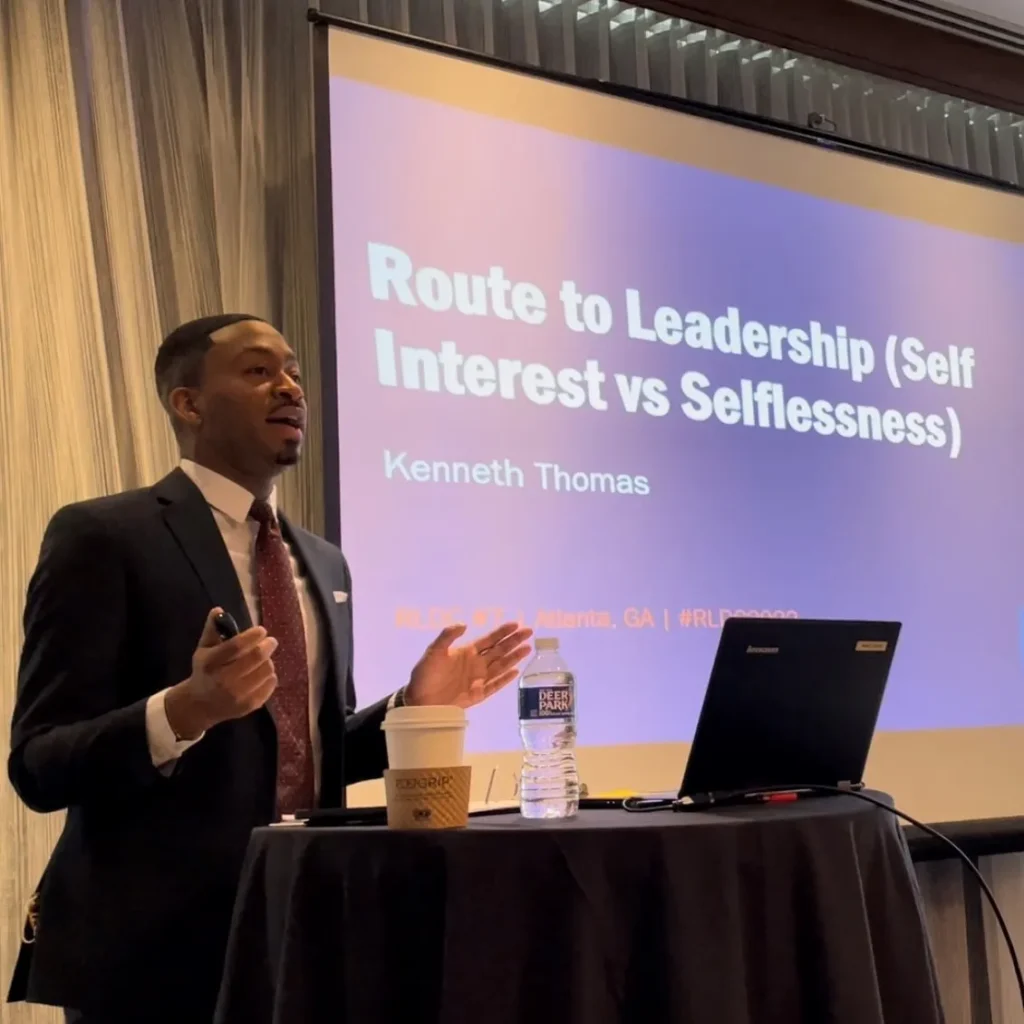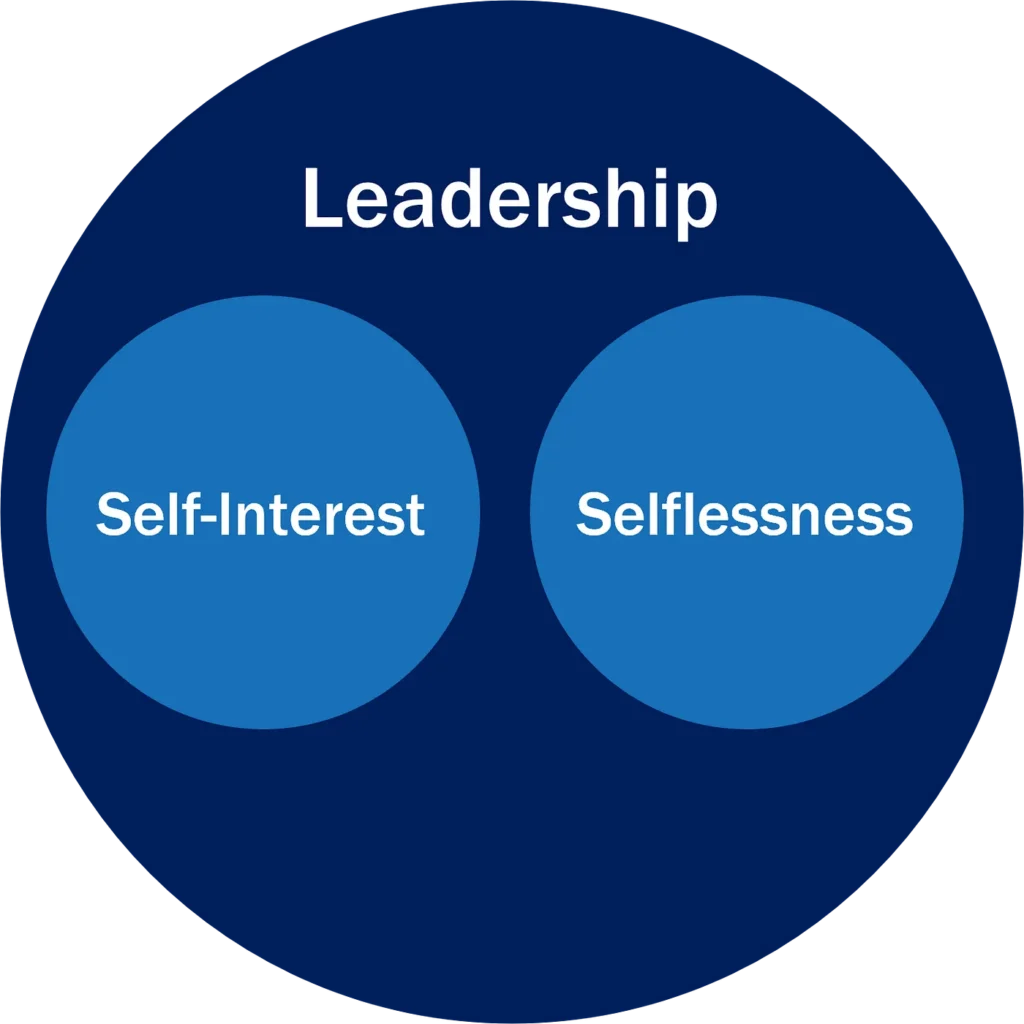I recently spoke on this topic at the Society of Hispanic Professional Engineers (SHPE) — Regional Leadership Development Conference (RLDC) in Atlanta, GA. I felt that sharing my script with online readers would be beneficial.

Introduction
First, I would like to thank my AT&T colleagues, especially Jordan Triplett, who reached out to allow me this opportunity. I want to start by stating that I may refer to AT&T’s Technology Development Program and my leadership role throughout my story.
I will review the definitions of leadership, self-interest (not to be confused with selfishness), and selflessness; and discuss their importance. I’ll also intertwine examples of each of these terms.

Leadership
What is Leadership?
Leadership is the ability of an individual or a group of individuals to influence and guide followers or other members of an organization.
Sadly the true meaning and importance of leadership have been lost with time. Most people associate being a good leader with making good money or being powerful, yet we constantly hear employees resigning from top multinational corporations because of poor leadership. A bad leader can break a company, but a good one will bring people together. That’s why many people would instead work for less pay but with a leader who understands and appreciates them.
Whenever you think of great leaders, you’ll picture people like Bill Gates, Elon Musk, or SHPE’s own Dr. Chris Wilkie, but it’s not just about the people at the top. Being a leader has nothing to do with power or success. Anyone can be a leader if they understand what it means.
You may even think leadership is just about managing a group of people because, after all, isn’t that what leaders do? Well, you’d be surprised because that’s hardly the case. So let’s discuss why it’s crucial to be a leader and how you can be one.
Why is Leadership Important?
A great leader isn’t just someone giving orders, bringing innovation, or creating value. Leaders help those around them to be at their best. They create an environment where people can gather and create value through collaboration. This is why people we look up to as great leaders do well in their respective industries. They work with their team to achieve success.
Humans are social animals by nature; we thrive when we work together, but lately, people have become more focused on themselves. Individuality is being pushed as the key to success. Group dynamics are being left behind, but a leader takes those individuals and turns them into a community.
A leader guides people to achieve their potential not only on their own but through work with others. However, our idea of leadership has been distorted. Now we think of power, high positions, and even money as measures of a good leader. But there are leaders everywhere in life, such as our parents and teachers. Their roles and their guidances are fundamental to the well-being of society. Just as they nurture and develop us as we grow into adults, a good leader must develop the people under their charge.
If you want those you lead to remain with you for a long time, you must lead intelligently and be mindful of their needs. While our notions of leadership are distorted, people are becoming increasingly more aware of the necessity of good leadership in today’s globalized economy.
More importantly, we have higher expectations of the people we choose to follow in leadership. A good leader can boost morale and improve the relationship between their team members. Building these relationships creates trust that creates an open and honest culture across an organization. I can also name several other benefits like inspiring confidence, improving employee engagement, and enabling innovation.
With all of this in mind, it was satisfying walking into my role with AT&T’s Technology Development Program to learn that part of the program’s mission is to develop our talent for roles as AT&T’s future leaders through collaboration in a high-trust environment. My colleagues and I make sure we do our part as leaders to allow our participants an ideal environment to accomplish just that and more.
Self-Interest
What is Self-Interest?
Not to be confused with selfishness, healthy self-interest is simply taking care of yourself but not at the expense of others. On the flip side, selfishness involves satisfying your own needs at the expense of others.
I saw a perfect example of self-interest online, and it states:
Imagine you’re flying a commercial jet seated between a very young child and a frail, very old adult. All of a sudden, the cabin loses pressure. The oxygen masks deploy and drop down in front of everybody. Now, who is the first person you put the oxygen mask on? The helpless child? The struggling senior? No, and no! As every flight attendant will announce during the safety briefing, we are instructed to put on our own masks first before attempting to help anyone else. Because if we don’t, we’ll pass out almost immediately. And then, not only will we have failed to help the child or the senior, but we now need help ourselves. Yet if we had first taken just a few seconds to secure our own air supply, we would have been able to attend to the people around us who might need help. Also, by taking care of ourselves first, we can often avoid the predicament of needing assistance ourselves. Thus, often only by helping ourselves first can we be in a position to offer or provide help to others.
In this situation, this isn’t a matter of us being selfish but a matter of acting out of self-interest first to get to a point where we can benefit others. This leads me to my next point.
Why is Self-Interest Important?
Simple, self-interest is important because it allows you to perform your best so that you have the opportunity to turn around and enable others to perform their best, which in the end helps everyone.
Selflessness
What is Selflessness?
In the eyes of leadership, selflessness is ethically leading others to achieve assigned goals and the greater good for the benefit of all others before oneself. I like to think of this as servant leadership. Servant leadership is squarely focused on the need to build and develop your team as your first priority.
The idea is that helping others succeed in and of itself is a righteous goal. Of course, when you work hard to maximize your team’s growth, they become more successful, and so do you.
Let’s briefly consider the major components of servant leadership. The first is a solid commitment to the growth of the people around you. This is the hallmark of servant leadership. You must have a sincere conviction to develop others because you believe people have an intrinsic value beyond their contributions as team members.
Ultimately, that’s why you seek to support your team’s professional and personal growth. How do you do that? It all starts with your own self-interest, perfecting your strengths, minimizing your weaknesses, and sharpening your personality. All the other behaviors I’ll mention become possible from this base of self-interest.
Components of Self-Intrest that lead to Selflessness
You begin building self-interest when you spend time assessing and solidifying your skills and relationships, supplemented by great feedback from a coach or mentor.
Next is using self-interest to learn how to listen. Any successful leader must be a strong communicator, which always includes strong listening skills. However, many of us err on problematically speaking far more than listening. Servant leaders know that they will maximize the outcome of any conversation by listening more than speaking. Only then can you effectively hear, see body language, and make a stronger connection.
Next is using self-interest to learn how to empathize. Empathy is the capacity to recognize emotion in others, which then allows us to feel some amount of compassion, caring, or concern in response. Being able to empathize with someone is partially driven by your personality, but it is also recognized as a skill that can be learned. Genuine rapport only begins when they believe you’re emotionally engaged.
The final component is learning how to facilitate healing. Even great teams experience plenty of conflicts. The difference is that great teams have the ability to heal wounds by laughing at themselves and making apologies when needed. When you model selfless behaviors, make your communication positive, and admit when you’re wrong, you can turn conflict into a positive event that actually makes the team better.
Why is Selflessness Important?
In the end, great leaders are selfless! They understand that the power that they have is not about them. Their power exists to ensure the benefit of the people who follow their lead.
Conclusion
It is evident that leading through self-interest and selflessness go hand-in-hand. You use self-interest to be selfless, which in the end is servant leadership.

Starting today, I ask that you invest in your self-interests to become selfless “servant” leaders.
Great leadership is not about the leader at all. Great leadership inspires others to work with you on a worthy cause.
Leave a Reply